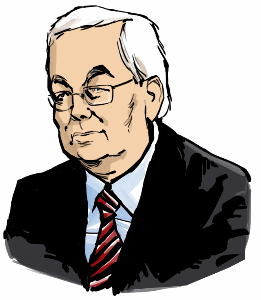© Gunnar Tómasson
16 February 2016
I. Isaiah‘s End of Times Prophecy
(Isaiah, Ch. 24:1-13, KJB, 1611)
696013
24238 = Behold, the Lord maketh the earth emptie, and maketh it waste,
33081 = and turneth it upside downe, and scattereth abroad the inhabitants thereof.
35274 = And it shall be as with the people, so with the priest, as with the servant,
30199 = so with his master, as with the maid, so with her mistresse,
39145 = as with the buyer, so with the seller, as with the lender, so with the borower,
31417 = as with the taker of usurie, so with the giver of usurie to him.
22883 = The land shall be utterly emptied, and utterly spoiled:
16960 = for the Lord hath spoken this word.
31187 = The earth mourneth and fadeth away, the world languisheth and fadeth away,
18311 = the haughtie people of the earth doe languish.
22730 = The earth also is defiled under the inhabitants thereof:
18544 = because they have transgressed the lawes,
22522 = changed the ordinance, broken the everlasting covenant.
19421 = Therefore hath the curse devoured the earth,
16902 = and they that dwell therein are desolate:
26945 = therefore the inhabitants of the earth are burned, and few men left.
33434 = The new wine mourneth, the vine languisheth, all the merrie hearted doe sigh.
28111 = The mirth of tabrets ceaseth, the noise of them that rejoyce, endeth,
10863 = the joy of the harpe ceaseth.
18439 = They shall not drinke wine with a song,
23284 = strong drinke shall bee bitter to them that drinke it.
17900 = The city of confusion is broken downe:
20478 = every house is shut up, that no man may come in.
19306 = There is a crying for wine in the streets,
18290 = all joy is darkened, the mirth of the land is gone.
33855 = In the citie is left desolation, and the gate is smitten with destruction.
25813 = When thus it shal be in the midst of the land among the people:
15981 = there shall be as a shaking of an olive tree,
20500 = and as the gleaning grapes when the vintage is done.
696013
II. When the vintage is done.
(Shakespeare Myth)
696013
An Olive Tree
10594 = Sir Francis Bacon, Knight
-1 = The Incarnation
As a shaking of an olive tree…
(Julius Cæsar, Act V, Sc. i – First Folio)
Cassius
12879 = Now most Noble Brutus,
17568 = The gods today stand friendly, that we may,
15686 = Louers in peace, leade on our dayes to age!
23178 = But since the affayres of men rests still incertaine,
21190 = Let’s reason with the worst that may befall.
17931 = If we do lose this Battaile, then is this
19984 = The very last time we shall speake together:
15404 = What are you then determined to do?
Brutus
15472 = Euen by the rule of that Philosophy,
14051 = By which I did blame Cato, for the death
19501 = Which he did giue himselfe, I know not how:
14406 = But I do finde it Cowardly, and vile,
19113 = For feare of what might fall, so to preuent
19095 = The time of life, arming my selfe with patience,
20623 = To stay the prouidence of some high Powers,
11326 = That gouerne vs below.
Cassius
13765 = Then, if we loose this battaile,
16527 = You are contented to be led in Triumph
14976 = Thorow the streets of Rome.
Brutus
7042 = No, Cassius, no:
13000 = Thinke not thou Noble Romane,
19844 = That euer Brutus will go bound to Rome,
16711 = He beares too great a minde. But this same day
19149 = Must end that work the Ides of March begun.
20191 = And whether we shall meete againe, I know not:
19155 = Therefore our euerlasting farewell take:
17976 = For euer, and for euer, farewell Cassius,
17336 = If we do meete againe, why we shall smile;
21165 = If not, why then, this parting was well made.
Cassius
18046 = For euer, and for euer, farewell, Brutus:
14916 = If we do meete againe, wee’l smile indeed;
21535 = If not, ’tis true, this parting was well made.
Brutus
17661 = Why then leade on. O that a man might know
17668 = The end of this dayes businesse, ere it come:
17050 = But it sufficeth, that the day will end,
20505 = And then the end is knowne. Come ho, away. Exeunt.
…And as the gleaning grapes
(Title page, First folio, 1623)
16746 = The Workes of William Shakespeare,
17935 = Containing all his Comedies, Histories, and
13106 = Tragedies: Truely set forth,
16008 = according to their first Originall.
696013
III. Virgil‘s Christ Prophecy – Francis Bacon’s Last Letter
Adam Rutherford – Iceland‘s Great Inheritance
(Augustan-Saga-Shakespeare Myth)
696013
Alfa
20087 = Magnus ab integro sæclorum nascitur ordo.¹
Francis Bacon‘s Last Letter²
(Easter Week, 1626)
14285 = To the Earle of Arundel and Surrey.
7470 = My very good Lord:
27393 = I was likely to have had the fortune of Caius Plinius the Elder,
19392 = who lost his life by trying an experiment
21445 = about the burning of the mountain Vesuvius.
27312 = For I was also desirous to try an experiment or two,
23426 = touching the conservation and induration of bodies.
27127 = As for the experiment itself, it succeeded excellently well;
19881 = but in the journey between London and Highgate,
18137 = I was taken with such a fit of casting,
20866 = as I knew not whether it were the stone,
24599 = or some surfeit of cold, or indeed a touch of them all three.
19809 = But when I came to your Lordship’s house,
20992 = I was not able to go back, and therefore was forced
10541 = to take up my lodging here,
27187 = where your housekeeper is very careful and diligent about me;
10692 = which I assure myself
24956 = your Lordship will not only pardon towards him,
14898 = but think the better of him for it.
21030 = For indeed your Lordship’s house is happy to me;
18831 = and I kiss your noble hands for the welcome
15120 = which I am sure you give me to it.
30197 = I know how unfit it is for me to write to your lordship
15772 = with any other hand than mine own;
32508 = but in troth my fingers are so disjointed with this fit of sickness,
12980 = that I cannot steadily hold a pen…
Adam Rutherford – Iceland‘s Great Inheritance³
(Isaiah, Ch. 24:14-16, King James Bible, 1611)
13054 = They shal lift vp their voice,
17503 = they shal sing, for the maiesty of the Lord,
13671 = they shall crie aloud from the sea.
18784 = Wherefore, glorifie ye the Lord in the fires,
22940 = euen the Name of the Lord God of Israel in the yles of the Sea.
26914 = From the vttermost part of the earth haue we heard songs,
13422 = euen glory to the righteous:
Omega
22692 = This was the last letter that he ever wrote.²
100 = The End.
696013
¹The phrase is a reference to the fourth Eclogue of Virgil, which contains a passage (lines 5-8) that reads:
Ultima Cumaei venit iam carminis ætas;
Magnus ab integro sæclorum nascitur ordo.
iam redit et Virgo, redeunt Saturnia regna,
iam nova progenies cælo demittitur alto.
Now comes the final era of the Sibyl´s song;
The mighty cycle of the ages begins anew.
And now justice returns, honored rules return;
now a new lineage is sent down from high heaven.
Medieval Christians read Virgil’s poem as a prophecy of the coming of Christ. The Augustan Age, although pre-Christian, was viewed as a golden age preparing the world for the coming of Christ. The great poets of this age were viewed as a source of revelation and light upon the Christian mysteries to come. (Wikipedia)
² Every schoolboy knows the story told in their history books how Francis Bacon one snowy day on or about All Fools Day, 1 April 1626, drove with the King’s Physician, Sir John Wedderburn, to Highgate and that at the foot of the Hill he stopped, bought a fowl, and stuffed it with snow with his own hands in order to ascertain whether bodies could be preserved by cold. During the procedure, we are told, he caught a chill, and instead of Dr. Wedderburn driving him back to Gray’s Inn (whence he had come) or taking him to some warm house, the worthy doctor took him to an empty summer mansion on Highgate Hill, Arundel House, where there was only a caretaker; and there Francis Bacon was put into a bed which was damp and had only been „warmed by a Panne“ (a very strange thing for a doctor to do) with the result that within a few days he died of pneumonia. Dr. Rawley, his chaplain, says that he died „in the early morning of the 9th April, a day on which was COMMEMORATED the Resurrection of Our Saviour“.
That is the story and this is [Francis Bacon’s Last Letter].
Here the letter ends abruptly. Whatever else was written has been suppressed by Sir Tobie Matthew, one of the Rosicrosse, on which Spedding remarks, „It is a great pity the editor did not think fit to print the whole.“ For some mysterious reason the letter was not printed until 1660 in Matthew’s Collection, captioned „This was the last letter that he ever wrote.” (Alfred Dodd, Francis Bacon’s Personal Life-Story, Rider & Co, London, 1986, pp. 539-540.)
³Isaiah, chapter 24, also portrays the great final cataclysm upon the nations, but shows that there will be one place that will shine forth as a beacon light in that dark night of worldwide trouble, and that the people there will be found worshipping and singing songs of praise to God, for in the middle of that chapter of woe there is interjected these words: „They shall lift up their voice, they shall sing for the majesty of the Lord, they shall cry aloud from the sea. Wherefore glorify ye the Lord in the fires, even the name of the Lord God of Israel in the isles of the sea. From the uttermost part of the earth have we heard songs, even glory to the righteous.“ (Isaiah, 24,14-16. English Bible.)
***
Calculator for converting letters to cipher values is at:

 Gunnar Tómasson
Gunnar Tómasson